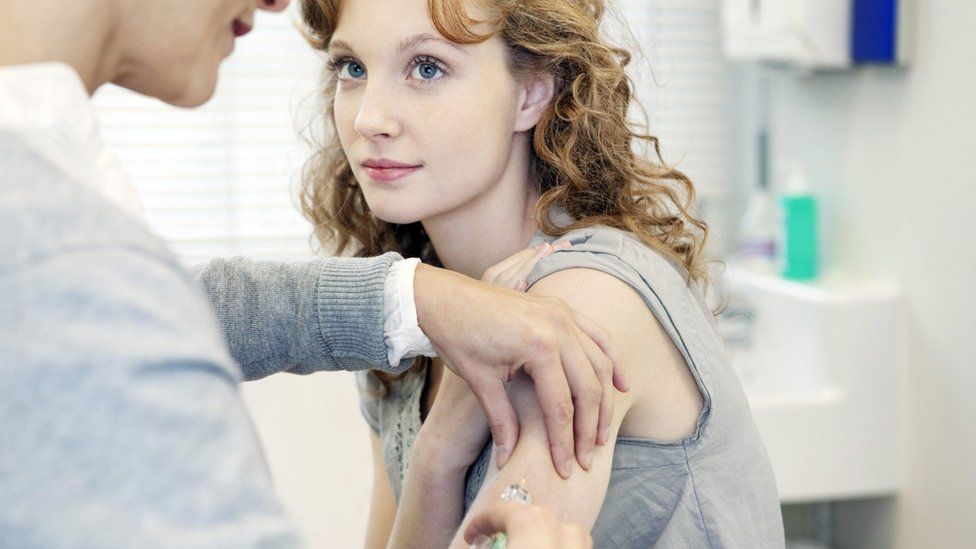32 minutes ago
About sharing
Cervical cancer will be eliminated by 2040, the NHS in England is promising.
NHS England boss Amanda Pritchard will say later that with improved rates of vaccination and screening, the point where almost nobody gets the cancer could be achieved within two decades.
But she will tell a conference of health leaders later that more must be done to boost vaccination and screening rates to achieve the goal.
Currently, around 2,600 women a year in England are diagnosed with the cancer.
Ms Pritchard will call for the NHS to learn from what worked during the Covid pandemic by offering catch-up vaccinations in community settings, such as libraries, halls and sports venues in areas with particularly low uptake – which is already happening in some places.
And she will say improvements will be made to the NHS app to make it easier for people to check on their vaccination history and book appointments.
Eliminating cervical cancer – defined by the World Health Organization (WHO) as getting to a really low rate of four cases per 100,000 – is something globally many countries are working towards. In Australia a goal of 2035 has been set.
To achieve it the WHO says targets of 90% for vaccination and 70% for screening will need to be achieved.
Latest figures show around 86% of girls and 81% of boys in England are getting the HPV vaccine.
HPV (human papillomavirus) causes 99% of cervical cancers and the vaccine being used is 90% effective protecting against the virus.
Therefore, cervical screening continues to play a key role in preventing cervical cancer and ensuring it is treated early.
The screening programme can spot the early signs of cancer and prevent three-quarters of cases ever developing.
But latest figures show one person in three of those eligible for screening does not come forward for it.
There will be an expansion of trials of self-testing screening kits to try to tackle this.
Currently there are 9.5 cervical cancer cases per 100,000 women in England – more than double the target rate and a figure that has remained steady for the past decade.
But since the HPV vaccine started being given to girls in 2008 there has been an 87% reduction in cervical cancers in this group, research has shown, suggesting the rate of incidence will start dropping in the coming years.
Cervical cancer
There are around 2,600 cases each year in England – 3,000 in total across the UK
Around 700 people a year die from the disease
It is one of the most common cancers in women under the age of 44, along with breast cancer
Screening via a smear test is offered in England every three years to women aged 25 to 49 and every five years between 50 and 64. Similar arrangements are in place in the rest of the UK
The HPV vaccine offers protection against the virus, which causes nearly all cervical cancer cases and some mouth and throat cancers
It is offered in schools to both girls and boys between the ages of 12 and 13 in England, Wales and Northern Ireland and those aged 11 and 12 in Scotland
Anyone eligible for the jab is able to get one via their GP up to the age of 25
Speaking in Liverpool at the annual conference of NHS Providers, which represents health managers, Ms Pritchard is expected to say she wants to make it “easier than ever” for people to protect themselves from cervical cancer.
“It is truly momentous to be able to set out such an important, life-saving ambition – to eliminate cervical cancer would be an incredible achievement.
“As ever, the public can play their part by coming forward for their vaccines and screening appointments when invited – to achieve our goal of eliminating cervical cancer, we need as many people as possible to take up the offer. So please don’t delay – it could save your life.”
Cancer Research UK’s Dr Julie Sharp, said eliminating cervical cancer was a realistic goal and she fully supported NHS England’s pledge.
But she said there needed to be targeted action to increase take-up of both vaccination and screening and to reduce the barriers that stop people coming forward – research shows embarrassment, previous bad experiences, difficulty booking appointments and not understanding what the smear test is for are all factors.
“This ambition will only be possible if the vaccination and screening programmes are backed by sufficient resource and modern IT infrastructure.”
Related Topics
4 November 2021
9 July 2019
13 September 2021
11 October 2021
13 September 2018


